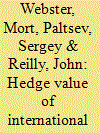| Srl | Item |
| 1 |
ID:
094856


|
|
|
|
|
| Publication |
2010.
|
| Summary/Abstract |
This paper estimates the value of international emissions trading, focusing on a here-to-fore neglected component; its value as a hedge against uncertainty. Much analysis has been done of the Kyoto Protocol and other potential international greenhouse gas mitigation policies comparing the costs of achieving emission targets with and without trading. These studies often show large cost reductions for all Parties under trading compared to a no trading case. We investigate the welfare gains of including emissions trading in the presence of uncertainty in economic growth rates, using both a partial equilibrium model based on marginal abatement cost curves and a computable general equilibrium model. We find that the hedge value of international trading is small relative to its value in reallocating emissions reductions when the burden sharing scheme does not resemble a least cost allocation. We also find that the effects of pre-existing tax distortions and terms of trade dominate the hedge value of trading. We conclude that the primary value of emissions trading in international agreements is as a burden sharing or wealth transfer mechanism and should be judged accordingly.
|
|
|
|
|
|
|
|
|
|
|
|
|
|
|
|
| 2 |
ID:
180091


|
|
|
|
|
| Summary/Abstract |
Canadian hydropower resources offer a potentially attractive option for meeting decarbonization targets in the US Northeast region, where there are ambitious climate goals and nearby hydro resources in Quebec. Existing transmission capacity is, however, a limiting factor in expanding hydropower imports to the region. To examine the value of expanding transmission capacity from Quebec to the Northeast, we employ an integrated top-down bottom-up modeling framework (USREP-EleMod). This research was part of an Energy Modeling Forum effort, EMF34, with a goal of better characterizing linkages in energy markets across North America. The scenarios we examine exogenously expand transmission capacity by 10, 30, and 50% above existing capacity into the US Northeast (New York/New England), finding the value to the economy of these expansions ranging from $.38-$.49 per kWh imported into New York, and $.30-$.33 per kWh imported into New England by 2050. The scenarios include economy-wide emissions goals these states have set for themselves. The carbon limits we imposed raise fuel prices more than electricity prices and as a result we found greater electrification in the US Northeast region from 2030 onward, a result that one would not see using just an electricity sector model, demonstrating a main hypothesis of EMF34, that models that looked at more integration across energy markets would give deeper insight than more narrowly focused models.
|
|
|
|
|
|
|
|
|
|
|
|
|
|
|
|